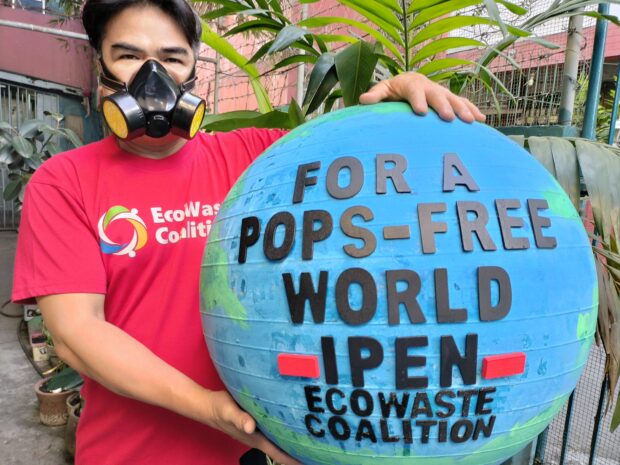
Photo courtesy of EcoWaste Coalition
MANILA, Philippines — Environmental groups are welcoming the decision of at least 120 countries to ban the use of plastic additive UV-328, flame retardant Dechlorane Plus (DP), and pesticide methoxychlor.
EcoWaste Coalition and the Interfacing Development Interventions for Sustainability (IDIS) said Sunday that government negotiators added the three chemicals to the list of Persistent Organic Pollutants (POPs) during the 11th meeting of the Conference of the Parties (COP-11) to the Stockholm Convention last week.
This means that plastic additive UV-328, flame retardant DP, and pesticide methoxychlor – which are linked to serious health conditions and threats to biodiversity – would now be subjected to a global ban.
Citing a global study, the groups pointed out that they found UV-328 in plastic pellets discovered on beaches and recycled plastic pellets in 35 countries, including the Philippines.
They also noted that in a related study, members of the International Pollutants Elimination Network (IPEN) and other organizations said that UV-328 was found in children’s toys and hair accessories.
EcoWaste Coalition and IDIS warned that this is alarming due to the plastic additive’s “toxicity and endocrine-disrupting effects.”
“We laud COP-11 for agreeing to get rid of DP, UV-328, and methoxychlor in keeping with the promise of the Stockholm Convention to protect human health and the environment from these highly dangerous chemicals,” EcoWaste national coordinator Aileen Lucero said in a statement.
“Eliminating these POPs and targeting additional POPs for action is essential to redirect the economy onto a non-toxic circular path and ensure environmental health and justice across the globe,” she added.
For his part, IDIS Executive Director Atty. Mark Peñalversaid: “The decision to list UV-328 and DP for global elimination will strengthen civil society’s push at the national level to prohibit the use of toxic chemical ingredients in plastics and phase out products and packaging materials containing substances that are hazardous to human beings, wildlife and the ecosystems.”
The environmental groups, however, lamented that while there are provisions in the Stockholm Convention on POPs that help identify waste containing DP and UV-328, some parties opposed including requirements for: labeling or identifying the chemicals as toxic, tracking the continued use of the dangerous substances, and putting in place a system to gradually eliminate products containing the hazardous chemicals.
“The COP took an important step today toward protecting human health and the environment from three chemicals linked to serious health conditions and threats to biodiversity. But we are disappointed that financial interests caused unnecessary and dangerous exemptions that will lead to ongoing toxic exposures, especially for waste workers and communities in low- and middle-income countries where materials containing these chemicals often end up,” said Dr. Sara Brosché, a science advisor of IPEN.
“It is clear that some countries are reluctant to put the necessary systems in place that would help keep track of these hazardous materials. The only solution is to move quickly to eliminate these and other toxic chemicals and adopt safer alternatives,” she added.
According to EcoWaste Coalition and IDIS, high levels of DP were found in blood, the food chain, and communities of Thai plastic e-waste workers, based on the study made by IPEN with Prague-based Arnika Association and Ecological Alert and Recovery-Thailand (EARTH).
They explained that DP is a toxic flame retardant used to dismantle plastics for recycling. Exposure to this chemical threatens human health, they added.
They also said that an e-waste worker’s blood contained 40 times higher levels of DP compared to a reference group of nearby organic farmworkers.
“The results of our study show contamination of toxic chemicals in the local food chain and the blood of e-waste workers, underscoring the importance of transparency in the regulation of chemicals in electronic and plastic waste,” said Thitikorn Boontongmai, manager of EARTH’s Toxic Waste and Industrial Pollution Program.
“With labeling of toxic chemicals, workers and communities throughout the plastic waste stream can be alerted when they need to take precautions. Everyone has a right to know when toxic chemicals threaten their bodies, food, and health,” he added.
RELATED STORIES
Environment advocates urge public: Switch to energy-saving, mercury-free lights
EcoWaste warns public: Children’s toys contain potentially harmful chemicals
Pro-environment groups call for responsible use, production of chemicals